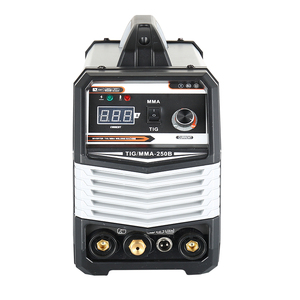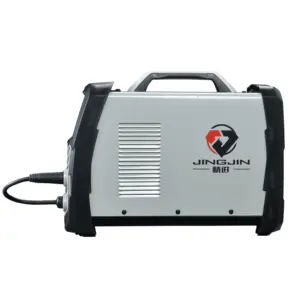(315 products available)









































































































































































A GTAW welding machine is a device that uses heat to join two pieces of metal. There are three primary types of welding machines:
This type of welding machine is designed with a traditional transformer. The machine is capable of changing the type of current it uses, which makes it suitable for welding on materials such as aluminum. This welding machine type works by first changing the AC (alternating current) to DC (direct current) and then utilizing the DC rectifier to get smooth DC current. The machine is also equipped with a high frequency (HF) arc start, which enables it to weld even on oxidized materials. Transformer-based AC/DC TIG welding machines are mostly used by business buyers in professional workshops for welding aluminum and its alloys as well as stainless steel.
This type of machine uses an inverter-based power supply. The welding machine changes the AC to DC using an internal rectifier. The inverter-based AC/DC TIG welding machine has a high frequency arc start and an arc force that makes it suitable for welding on most metals. This welding machine is light and portable, which makes it easy to transport from one place to another. It is mostly used by business buyers in a professional workshop, repair, and maintenance for its versatility.
It's a type of TIG machine that is equipped with a water-cooling system. The machine cools the torch and the power cable by circulating water, which helps to lengthen the duration of the welding. The water-cooled TIG welding machine is mostly used when welding thick materials and in a situation where long welding periods are needed.
The specifications of the GTAW welding machine vary depending on the model and manufacturer. However, some general specifications are shared among them. The welding current source of the GTAW welding machine can have a current range of 0-200 A or 0-315 A. The power source frequency can range from 50 Hz to 60 Hz. The duty cycle of the GTAW welding machine is usually 60%. This means that it can weld continuously for 6 minutes at a given current, after which it can cool down for 4 minutes.
The GTAW welding machine requires regular maintenance to ensure it is fully operational and to avoid any accidents. Before performing any maintenance procedure, it is always a good idea to read the manufacturer's manual. The first thing to do is to ensure that the machine is always clean. This includes removing any dust, dirt, or debris that may have accumulated on its surface. Cleaning can be done using a clean, dry cloth or a vacuum cleaner. The welding machine should also be inspected on a regular basis to locate any loose components. If any is found, it should be tightened to ensure that it is held securely in place.
It is important to regularly inspect the welding cables for any signs of damage or wear. If any is found, it should be replaced immediately. The gas hoses and fittings should also be inspected for damage or leak. The gas flow should also be inspected to confirm that it is set to the correct rate. The welding machine should always be used in a well-ventilated area. This is to prevent the buildup of welding fumes that can be hazardous to one's health. When welding, it is important to wear the welding safety gear to prevent burns and injuries. The last thing is to ensure that the machine is turned off when not in use.
GTAW welding machines are commonly used in various industries that require strong and high-quality welds. Here are some common usage scenarios of GTAW welding machines.
GTAW welding machines are widely used in the automotive industry for welding auto parts like exhaust systems, frames, and aluminum panels. GTAW welding is suitable for welding automotive components with strict requirements for weld quality and appearance.
GTAW welding machines are often used in the aerospace industry to weld components of aircraft, such as fuselages, engine parts, and landing gear. GTAW welding provides precise control, high-quality welds, and minimal distortion, which meets the high safety and performance standards of the aerospace industry.
GTAW welding machines are widely used in the food processing industry to weld stainless steel equipment such as storage tanks, pipelines, and mixing vessels. GTAW welding machines produce clean and precise welds that meet the strict sanitary standards required in food processing.
In the pharmaceutical industry, GTAW welding machines are used to weld stainless steel equipment such as reactors, piping systems, and sanitary fittings. GTAW welding produces high-quality and sanitary welds, which helps to prevent contamination and meet rigorous regulatory requirements in the pharmaceutical industry.
GTAW welding machines are often used in the power generation industry to weld components of turbines, boilers, and heat exchangers. GTAW welding produces high-quality welds with excellent strength and reliability, meeting the demanding operating conditions of power generation equipment.
GTAW welding machines are used in the electronics manufacturing industry to weld components such as metal enclosures, connectors, and circuit boards. GTAW welding produces precise and clean welds without damaging delicate electronics components, ensuring the integrity and functionality of electronic devices.
When buying a TIG welding machine for sale, buyers need to consider the following factors:
This is one of the key factors that need to be considered when choosing a TIG welding machine. The thickness and type of the material will affect the welding machine's power, amperage range, and welding capability. Therefore, it is important for buyers to determine their material type and thickness before making a purchasing decision.
Amperage and power are important factors that need to be considered when choosing a GTAW welding machine. The amperage range of a welding machine will affect its welding performance and capacity. Low-amperage machines are suitable for thin materials, while high-amperage machines are better suited for thicker materials.
Depending on the welding purpose, buyers need to choose a welding machine with a suitable amperage range to ensure it can meet the welding requirements.
Duty cycle is an important factor that affects the welding efficiency of a welding machine. It is defined as the percentage of a ten-minute cycle that a welding machine can operate at a certain current without overheating. Normally, the duty cycle is represented as a ratio of 10.
For example, a welding machine with a duty cycle of 60% means that it can continuously weld for six minutes at a certain current level and then rest for four minutes before repeating the cycle. Therefore, buyers need to choose a welding machine with a suitable duty cycle to ensure it can meet their welding needs.
Q: What are the benefits of TIG welding over MIG welding?
A: TIG welding, or GTAW, offers several key benefits over MIG welding. For starters, it produces clean, high-quality welds with no spatter and minimal distortion. It also allows for greater control of the welding process, which is ideal for smaller and more precise projects. Moreover, it can be used on a variety of materials.
Q: What is the difference between inverter welders and regular welders?
A: Inverter welders use electronic inverter technology to convert AC power to DC power. In contrast, traditional welders use a large transformer to change the voltage. Inverter welders are lighter, smaller, and more efficient than regular welders. They also provide more precise control over the welding process.
Q: Can a TIG welder weld aluminum?
A: Yes, TIG welders can weld aluminum. In fact, they are ideal for welding aluminum. When welding aluminum, AC current is typically used. This allows for better cleaning and a stable arc. In addition, TIG welding aluminum requires specialized techniques and equipment. This includes using pure argon gas and a high-frequency AC/DC power source.
Q: What is a TIG welder used for?
A: TIG welders are versatile tools used for a variety of welding applications. This includes automotive repairs, aerospace, fabrication, and more. They can weld a wide range of materials, including stainless steel, aluminum, and carbon steel. TIG welders are known for producing clean and precise welds.